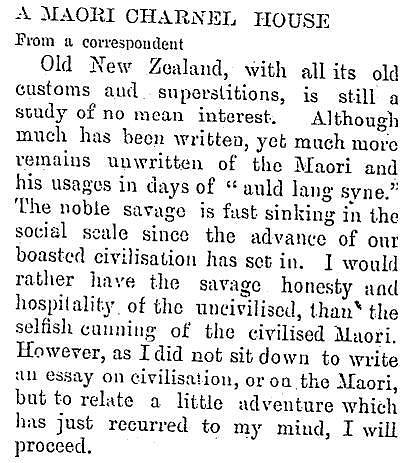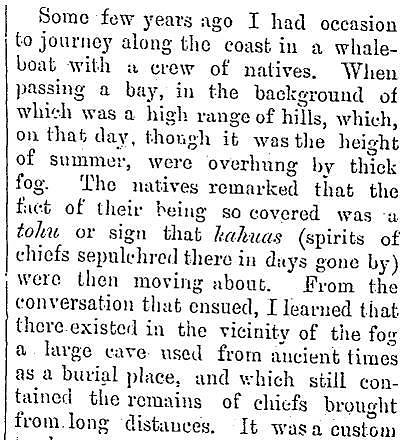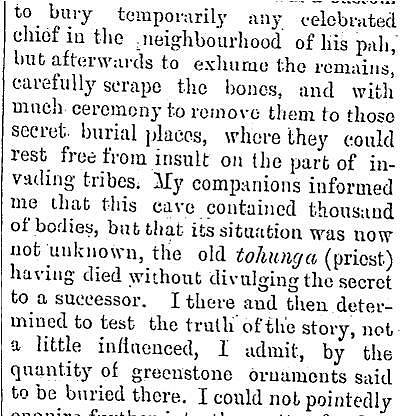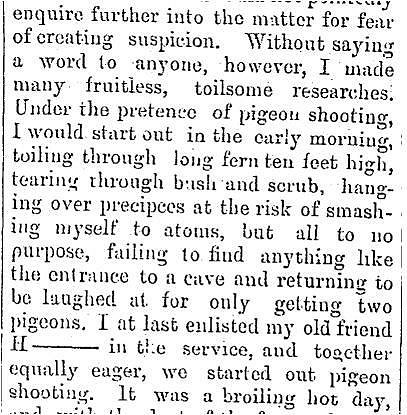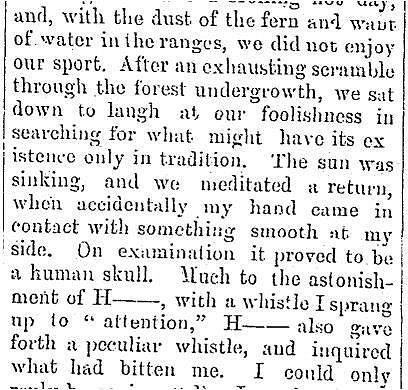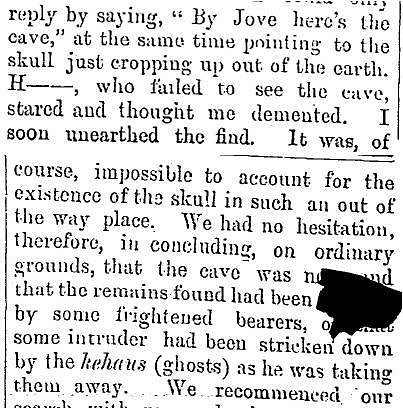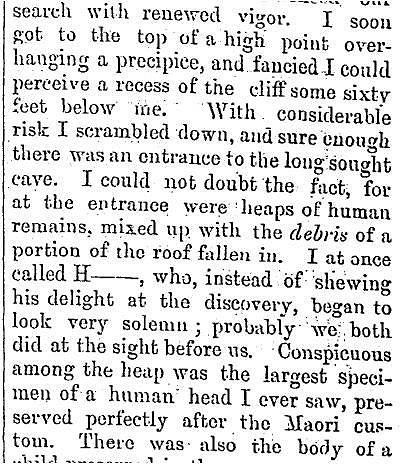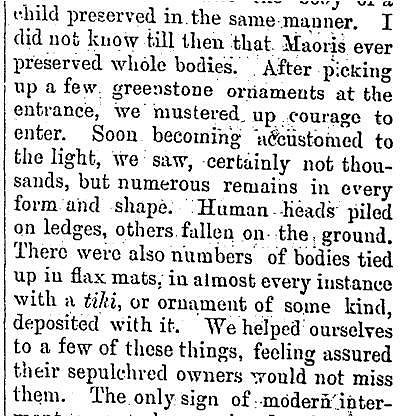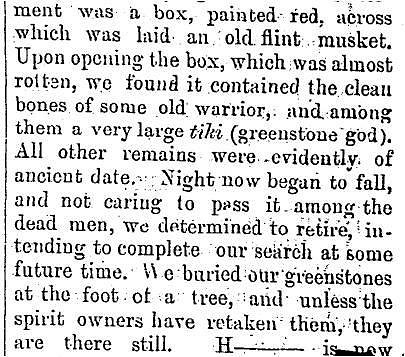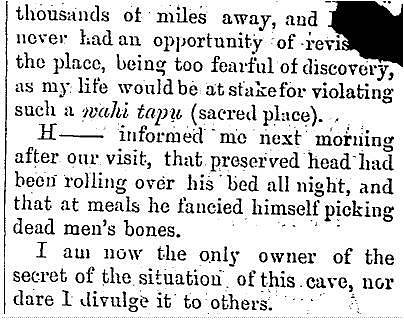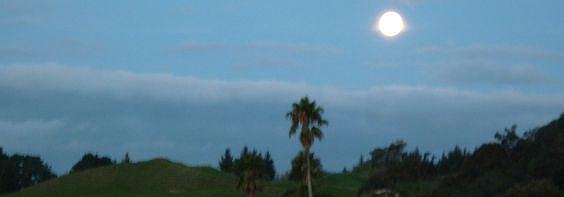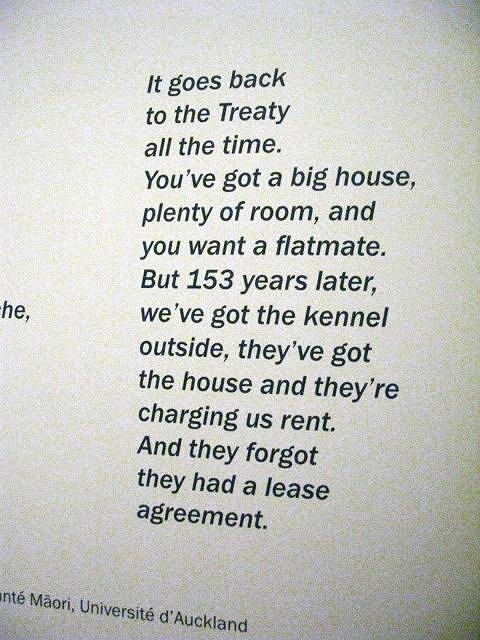Pages: 1 16 replies
|
T

TikiTomD
Posted
posted
on
Tue, Nov 15, 2011 12:40 PM
The following article came from the digitized archives of the National Library of New Zealand (http://paperspast.natlib.govt.nz/cgi-bin/paperspast?a=d&d=WH18730320.2.10)... The Wanganui Evening Herald March 20, 1873 -Tom |
|
CN
Club Nouméa
Posted
posted
on
Tue, Nov 15, 2011 4:25 PM
Yes, sadly in those days, Europeans had no hesitation in seeking out Maori burial sites and taking items from them; behaviour which, if it had been carried out in a European cemetery, would have been considered grave-robbing. CN |
|
K
komohana
Posted
posted
on
Tue, Nov 15, 2011 4:47 PM
The Evening Herald said: "Where they could rest free from insult on the part of invading tribes." hmmm... perhaps grave desecration was not unknown before the arrival of the europeans. |
|
T

TikiTomD
Posted
posted
on
Tue, Nov 15, 2011 5:56 PM
CN, the same may be said of Native American and Native Hawaiian burial sites, which suffered desecration throughout history from looters, scientists, archaeologists and developers. US federal and state laws to address grave protection, as well as repatriation of remains and burial objects, were enacted in more recent times. This is pretty much a global issue in human affairs. -Tom |
|
CN
Club Nouméa
Posted
posted
on
Tue, Nov 15, 2011 11:26 PM
Point well taken Tom. I recall calling in at the South Bay Street Shopping Center in Emeryville (near Trader Vic's), and discovering whilst visiting the toilets there that the shopping centre is built on an ancient Indian shellmound which includes a burial site. There were Ohlone images and relics on display in the foyer of the public toilets, which is better than nothing, but did strike me as being odd. I remember at the time wondering how I would feel if a foreign power invaded my land, leveled my cultural monuments, built a toilet on them and then hung some pictures outside it as a reminder of my people... :) Komohana; there may have been exceptions to the rule, but my general impression is that the various Maori tribes left each other's burial sites alone because they all believed that such a violation of tapu would bring terrible curses and bad luck upon them. In pre-European times, the Maori lived in a spiritual world where you didn't mess with things like that. CN
[ Edited by: Club Nouméa 2011-11-15 23:28 ] [ Edited by: Club Nouméa 2011-11-15 23:33 ] |
|
K
komohana
Posted
posted
on
Wed, Nov 16, 2011 1:41 AM
perhaps... |
|
T

TikiTomD
Posted
posted
on
Wed, Nov 16, 2011 10:22 AM
komohana, your point is also on the mark. Indigenous peoples, colonials and contemporary human societies were or are all capable of great nobility and selflessness, as well as cruelty and atrocity. No single group can lay exclusive claim to one end of the moral spectrum. So, it would indeed amaze me if the Maori didn’t do some hell raisin’ back in time. And there’s historical evidence that they did. I appreciate these old news articles both for the story content and for the window back into time on social mores and customs. You can clearly see historical changes in cultural sensibilities or, as CN would rightly point out for this particular instance, cultural insensitivity. Time moves on and views moderate as assimilation and atonement is attempted for past transgressions and intolerance, if a stable civil society develops. When sensitivity eventually triumphs over truth, we have arrived at political correctness. -Tom |
|
CN
Club Nouméa
Posted
posted
on
Wed, Nov 16, 2011 3:05 PM
As I said; "there may have been exceptions to the rule". Incidentally, I only just looked up Komohana's link to the site on "Ancient Celtic and Viking New Zealand". That site is classic fruitcake stuff. The whole tone of the writing verges on hysterical: "Oh yes you didn't realise...";"Oh yes it did happen"; any my personal favourite - "As of Late August 2000. Maori are now claiming, even in parliament, that they are suffering from "post-colonisation trauma" and this is the justifiable reason that they bash their children to death!". It would take me pages of writing to thoroughly dismantle that link, but there has long been a certain mentality among a certain portion of Pakeha society here that this page typifies. Basically their line of thought goes "well, those Maoris did terrible things back in their day, so it's only right that they were colonised by us civilized Europeans, and anyway, were the Maori REALLY the first occupants of New Zealand? What about the Moriori? Maybe those Maoris had it coming for all those awful things they did." So what about the Moriori? Well, firstly, they lived in the Chatham Islands, an isolated archipelago that is over 500 miles off the coast of New Zealand. Secondly, the 500 or so North Island Maori who invaded the Chathams in 1835 and massacred and enslaved the Moriori were transported there on a British ship, and they used European firearms as well as traditional weapons to carry out their deeds. It could be argued that the event would not have happened had it not been for Europeans facilitating it. Such people have a reductionist view of history with a high level of blame-shifting which does not square with historical details that they prefer to overlook. My hope is that one day, New Zealand society will reach a level of mutual understanding where people will no longer indulge in this sort of thinking. CN
[ Edited by: Club Nouméa 2011-11-16 15:09 ] [ Edited by: Club Nouméa 2011-11-16 15:10 ] [ Edited by: Club Nouméa 2011-11-16 15:25 ] [ Edited by: Club Nouméa 2011-11-16 15:36 ] |
|
K
komohana
Posted
posted
on
Wed, Nov 16, 2011 5:15 PM
entirely on point and the reasoning behind my initial response. CN, your calm and measured comments are as i'd expected from you, yes that link certainly does contain here's another overview of events, |
|
K
komohana
Posted
posted
on
Wed, Nov 16, 2011 5:41 PM
CN, i'll borrow an old saying here; "you can lead a horse to water, but you can't make him drink". |
|
B
bigbrotiki
Posted
posted
on
Wed, Nov 16, 2011 6:45 PM
Wow, fascinating information, on a well-done website! How great that so much of the Moriori history has survived, even after they were practically extinguished as a people. Certainly a dark spot in the Maori past. And certainly not the only one, but as pointed out above: Both, colonizers and natives had theirs. American indian tribes killed and scalped each other, too, that doesn't make the crimes of the colonizing Europeans any less grave. And yeah, that "Ancient Celtic and Viking New Zealand" link smacks of the kind of revisionism that Neo-Nazis in Germany practice when claiming that the Holocaust never happened and no Jews were ever killed. And the way it is using cannibalism to demonize the Maori even today sure makes one cautious about that Savage Club emblem discussed elsewhere. That would play right into that guy's camp - but also denounce his ramblings even more as propaganda. |
|
CN
Club Nouméa
Posted
posted
on
Wed, Nov 16, 2011 11:59 PM
Cannibalism is a very touchy issue in New Zealand. Fairly recently a book of a historical nature was published on it, called "This Horrid Practice": http://en.wikipedia.org/wiki/This_Horrid_Practice Although it is a sober overview devoted to a legitimate matter of historical interest, it has drawn fire from all sorts of quarters, ranging from Maori elders outraged that the topic should even have a book devoted to it, through to niggling Pakeha historians who have seeked to poke holes in it: http://www.listener.co.nz/commentary/close-to-the-bones/ I haven't read the book, so I can't pass judgement, but this sort of thing gives you an idea of just how worked up people in New Zealand get about this issue. CN
[ Edited by: Club Nouméa 2011-11-17 00:00 ] [ Edited by: Club Nouméa 2011-11-17 00:01 ] |
|
K
komohana
Posted
posted
on
Thu, Nov 17, 2011 11:36 AM
i don't feel the need to defend the author of that site in any way, shape or form, i am simply interested in the goings-on regarding our neighbours across the tasman sea edit- this of course is a deviation to this thread, just mentioned it in passing. [ Edited by: komohana 2011-11-17 11:44 ] |
|
B
bigbrotiki
Posted
posted
on
Thu, Nov 17, 2011 2:19 PM
Agreed, as an outsider my knowledge is limited too, especially in regards to that land rights treaty that the Maori say was intentionally falsely translated into Maori language. But I dug this comment I found last month in the current Maori exhibition at the Quai Branly Museum in Paris:
|
|
CN
Club Nouméa
Posted
posted
on
Thu, Nov 17, 2011 3:38 PM
That quote is brilliant - it pretty much sums things up too. Still, it's not all bad; the Waitangi Tribunal has settled a lot of grievances, although the wrongs of the past have not yet all been righted, and may never be. Even so, to give just two examples, out Paipo's way in Westland, Pakehas do not have the right to pick up greenstone (jade) from riverbeds as the result of treaty claim settlements reflecting Maori ancestral rights (some white fellas with a helicopter were successfully prosecuted for hauling out some big slabs of greenstone some years ago, much to their chagrin). Also, the Ngai Tahu (the main tribe in the South Island) have been recognised as the guardians of the whole of the Southern Alps. I have the impression that overall things are getting better here, and we can be grateful that our race relations are not as bad as, say, South Africa's. CN |
|
T

TikiTomD
Posted
posted
on
Thu, Nov 17, 2011 3:53 PM
Regarding Maori rights in New Zealand and the ambiguity of the Treaty of Waitangi, I came across these web articles (Club Nouméa likely can steer those interested into better sources)... http://www.newzealand.com/int/article/treaty-of-waitangi/ http://www.northernadvocate.co.nz/news/protect-maori-rights-tribunal/1061170/ http://www.gisborneherald.co.nz/article/?id=25384 The following article is clearly not sympathetic to the Maori, illustrating a very different viewpoint... -Tom |
|
B
bigbrotiki
Posted
posted
on
Thu, Nov 17, 2011 4:07 PM
On the last one, just got down to the last paragraph, you know where the author is at: "Ayn Rand observed:....." |
Pages: 1 16 replies


